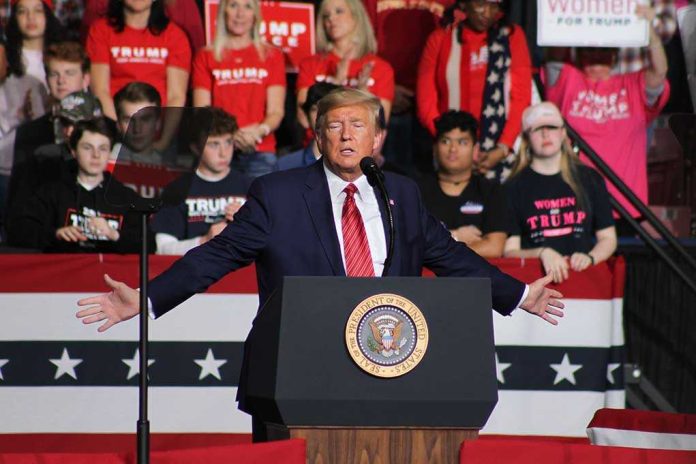
Supreme Court strikes a decisive blow against judicial activism, empowering President Trump with the historic ruling that nationwide injunctions exceed judicial authority, ending decades of activist judges’ meddling in presidential powers.
Key Takeaways
- The Supreme Court ruled 6-3 that district courts cannot issue nationwide injunctions, calling them an abuse of judicial power that exceeds authority granted by Congress
- Justice Amy Coney Barrett delivered the majority opinion, emphasizing that universal injunctions go beyond the equitable authority granted to federal courts
- The ruling represents a significant victory for President Trump, removing a key obstacle that liberal judges have used to block conservative policies
- Future plaintiffs seeking broad relief must now file class action lawsuits rather than relying on a single judge to implement nationwide blocks
- Justice Ketanji Brown Jackson’s dissent was sharply rebuked by Barrett, who accused her of embracing “an imperial Judiciary”.
A Landmark Victory Against Judicial Overreach
In a monumental 6-3 decision, the Supreme Court has fundamentally transformed the balance of power between the executive branch and the judiciary by ending the practice of nationwide injunctions. The Trump v. Casa ruling establishes that individual district court judges can no longer block presidential policies across the entire country, restricting their power to only the parties directly involved in a case. This decision hands President Trump a significant victory in his ongoing efforts to implement his agenda without constant judicial interference from activist judges in liberal districts.
“Universal injunctions likely exceed the equitable authority that Congress has given to federal courts,” wrote Justice Amy Coney Barrett in the majority opinion, firmly establishing that lower courts have been operating beyond their constitutional authority for decades. President Trump celebrated the ruling as a “monumental victory for the Constitution, the separation of powers, and the rule of law,” highlighting how this decision strengthens presidential authority and prevents rogue judges from controlling national policy.
The Left is trying to frame today’s nationwide injunctions decision as a new expansion of the executive’s power and a restriction of the judiciary’s power. In reality, the Trump v. CASA decision helps restore the balance of power between the branches, reining in the “imperial… https://t.co/v9jisz7Euv pic.twitter.com/AAg4l55gpv
— Heritage Foundation (@Heritage) June 27, 2025
The End of Judicial Forum Shopping
The ruling specifically targets the left-wing strategy of “forum shopping” – the practice of seeking out sympathetic judges in liberal districts to block conservative policies nationwide. For years, Democrat-aligned groups have exploited this tactic to hamstring President Trump’s immigration reforms and other executive actions. Now, that avenue has been closed. The decision in Trump v. Casa requires that relief granted by district courts must be limited to the actual parties in the lawsuit, preventing a single judge from effectively vetoing presidential actions nationwide.
“We will not dwell on JUSTICE JACKSON’s argument, which is at odds with more than two centuries’ worth of precedent, not to mention the Constitution itself. We observe only this: JUSTICE JACKSON decries an imperial Executive while embracing an imperial Judiciary,” Justice Amy Coney Barrett, Supreme Court Justice
Justice Barrett’s searing rebuke of Jackson’s dissent underscores the conservative majority’s commitment to reining in judicial activism. The ruling represents a direct challenge to the notion that individual district judges should have the power to countermand presidential authority across the entire nation, especially when such judges may be operating from partisan motivations rather than sound constitutional principles.
Implications for Executive Power and Immigration Policy
Although the case centered on procedural questions rather than the substantive issue of birthright citizenship, the ruling effectively removes a major obstacle to President Trump’s immigration agenda. The Casa case specifically involved Trump’s executive order addressing birthright citizenship under the Fourteenth Amendment, but the Court’s decision applies broadly to all executive actions. With district courts no longer able to issue nationwide injunctions, the implementation of Trump’s policies on immigration, border security, and other key issues will face fewer judicial roadblocks.
“No one disputes that the executive must follow the law, but the judiciary does not have unbridled authority to enforce this obligation. Sometimes the law prohibits the judiciary from doing so,” Justice Amy Coney Barrett, Supreme Court Justice,
The liberal justices’ dissent revealed their concern about losing a key tool used to obstruct conservative policies. Justice Sotomayor complained that “with the stroke of a pen, the president has made a solemn mockery of our Constitution,” while Justice Jackson warned the decision is “an existential threat to the rule of law.” These hyperbolic objections merely confirm that nationwide injunctions have become a political weapon rather than a legitimate exercise of judicial authority.
New Legal Landscape for Policy Challenges
The ruling creates a significant shift in how policy challenges will proceed through the courts. Opponents of presidential actions must now pursue class action lawsuits to achieve broad relief, requiring more substantial legal resources and stronger evidence of common injuries. This higher threshold ensures that frivolous challenges with weak legal foundations will be less likely to impede the implementation of executive policies. Organizations seeking to block presidential actions will face a much steeper climb than simply finding a sympathetic judge in a favorable jurisdiction.
For conservatives, this ruling represents a long-overdue correction to judicial overreach that has plagued presidential administrations for decades. By limiting district courts to their proper role within their jurisdictions, the Supreme Court has restored constitutional balance and strengthened the separation of powers. President Trump now has greater latitude to implement his agenda without individual judges imposing their political preferences on the entire nation through the abuse of nationwide injunctions.




